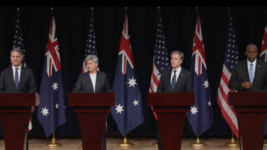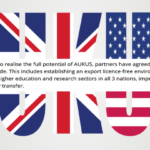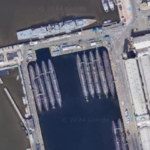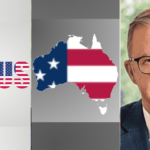AUSMIN Further Confirmed Labor’s Tossed the Keys to Australian Defence to the Pentagon

Australian defence minister Richard Marles made an extremely telling quip during opening remarks at this year’s AUSMIN conference, and that was to state that Australia is “experiencing a navy takeover of our defence force”, and by that he kiddingly meant that the US has taken over our navy.
But this joke by Marles, who’s also this nation’s deputy prime minister, isn’t really just joshing around as the Albanese government has been handing an increasingly greater amount of control of not just the Australian Navy, but the entire Australian defence apparatus over to the United States.
This year, the 34th AUSMIN (Australia-United States Ministerial Consultation), which involves both nation’s foreign and defence ministers discussing matters of joint military interest, took place at the United States Naval Academy in Annapolis in the US state of Maryland.
“If you look at the force posture of the United States on the Australian continent, we’ve seen a growth in marine rotation in Darwin,” Marles continued, and went on to add that “in fact, that force posture lay down of the United States in Australia is across all domains”.
According to US Defence, force posture means “the overall military disposition, strength, and condition of readiness”. And in this instance, we have our deputy PM welcoming the fact that the US is prepared for action conducted from this continent across the entire spectrum of military pursuits.
Our ironclad commitment
During the press conference held after the Australia-US consultations, Australian foreign minister Penny Wong reminded those before her that this was the third AUSMIN that has involved US secretary of state Antony Blinken, US secretary of defence Lloyd Austin, Richard Marles and herself.
The minister added that the meetings have “all been really warm, open, trusting engagements, and this one particularly so”. And it’s nice to hear that over the years that she and Marles have increasingly gifted the US more control over our military that it’s been enjoyable.
Wong also assured that our nation remains lockstep with the comments Blinken had already spelt out as he touched upon the Middle East during his remarks, in which he included an “ironclad commitment to the defence of Israel and to remain prepared to respond to any contingency”.
The consultations chiefly considered how to ensure a “peaceful, open and prosperous” Indo Pacific, Wong continued, without breaking a smirk, even though the entire purpose of the last three years of discussions has been increasing the militarisation of the region in preparation for war with China.
And further, Wong added that the US had endorsed our joining the Framework to Counter Foreign State Information Manipulation, which requires partners taking proactive approaches to combat foreign manipulation, which “civil society, independent media, and academia” can play a vital role in.
“The primary point I wanted to emphasise… was this, American leadership matters,” Wong stressed, at a point in time when the US empire appears in serious decline. “American leadership has always mattered, and it remains vital.”
“Today, it’s vital for peace, for prosperity in a free and open world,” the foreign minister added, despite the US continuing to fund a 10-month-long barbaric genocide in the Gaza Strip, as well as pushing for a coming war on China.
“So, we acknowledge and thank United States of America for that leadership.”
Great southern US military base
To put the idea of force posture into more perspective in 2011, the Gillard government entered into a force posture arrangement with the US, which the Abbott government made official under the 2014 Force Posture Agreement.
This involves increasing interoperability between Australian and US air forces, via the stationing of a US air force presence on this continent, and it also permits the continued permanent rotation of around 2,500 US marines in the Northern Territory.
The agreement further provides the US with unimpeded access to a classified list of local “areas and facilities in Australia”, and when the Pentagon decides to upgrade one of our local bases, the US military then takes complete control of the facility whilst it engineers its improvements.
As Austin addressed 7 August presser, the defence secretary mentioned “three key items”. The first was “we agreed to continue deepening our force posture cooperation”, which means federal Labor has ensured the US can increase its military presence on the continent and its influence on the ADF.
This involves the US upgrading air bases in WA and the NT and beginning to operate out of RAAF Learmonth and logistically in Bandiana. US rotational forces here are also increasing, which means more US maritime patrol and reconnaissance aircraft, as well as more bomber deployments.
The next point he raised was increasing US defence industrial base cooperation, in terms of Australia’s guided weapons and explosive ordnance enterprise and moving towards manufacturing guided multiple launch rocket systems and developing co-production of precision strike missiles.
And the third point is that Australia will be increasing its military ties with Japan and the Philippines, as the US already has firm relationships with those countries, having just held similar such consultations with their relevant ministers, and these links too entail the buildup to war on Beijing.
Indeed, AUSMIN 2022 included a determination to invite Japan to join and play an increasing role in the US force posture initiatives on this continent.
In Uncle Sam’s command
Back during his opening remarks on 6 August, Marles remarked that the decisions made at AUSMIN over recent years are now resulting in “real change”, and he stressed that this was due to the laws facilitating the AUKUS agreement that were passed in the US last year and in Canberra last March.
Yet, it’s since come to light that the US legislation doesn’t guarantee that Washington will supply any nuclear-powered submarines (SSN) to Australia, even though this was key to the initial AUKUS agreement on launch, as this nation was to acquire eight such subs with US and UK assistance.
What Marles instead asserted in his opening and closing remarks is that our nation is looking forward to the coming of US-UK Submarine Rotational Force – West, which involves mainly US SSN stationed in WA by 2027, which will act as a forward base for the US in terms of attacking China.
SRF-West, as the rotational force is also known, is to consist of four US SSN and one UK SSN that will be stationed at HMAS Stirling on Garden Island off the coast of Perth. Yet, a recent US congress thinktank report suggests broadening this force with US SSN rather than Australia acquiring its own.
More than 700 US military personnel and their families will be moving into the region to run the too-complicated-for-Australians-to-operate militarised boats and the Albanese government has just signed off on allowing the US and UK to store their nuclear waste from the subs on the island.
So, no longer shall we speak of our subs, but rather Marles further stated in closing that “a generational dream in establishing a seamless defence industrial base between Australia and America” has been realised, in referring to the US having made Australia a domestic military source.
And as is incrementally coming to be understood, the AUKUS security pact, which initially centred on eight Australian SSN, appears to be rather facilitating a greater US military presence, especially an SSN presence, as well as the US having gained direct access to local deposits of critical minerals.
“American force posture now in Australia involves every domain: land, sea, air, cyber and space,” the Australian deputy PM said proudly towards the end of his remarks, as if this is what his nation had elected federal Labor into office for – some dim hope of becoming an unofficial 51st US state.
And after listing a few more inroads the US has positioned itself in, Marles ended with “this is greatly going to enhance the United States’ ability to operate in Australia”, which sounds a little like the minister might benefit from undergoing counselling himself regarding foreign state manipulation.







